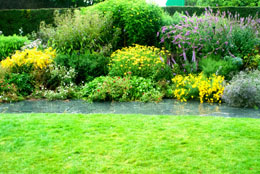With the go green mantra spreading in every nook and corner of the world, it is the moment to bring a revolution even in our homes. Rain gardens are the excellent options for making a difference in water quality in our communities. Know more about it here.

The shift from rural to the urbanized world in the past decades has led to tremendous loss of natural vegetation in the cities. One of the dangerous water pollution issues that has concerned environmentalists is that of storm water runoff. In the industrialized world, runoff problem has worsened in the last few years.
What is Storm Water Runoff?
When water that precipitates on the ground is not absorbed, it makes way through the yards, streets, driveways, gardens, parking spaces, lanes and every possible path it can get to reach the storm sewers and through it to small lakes, rivers near communities, cities or towns. Storm water runoff carry with them chemicals, pesticides (through gardens) and other deposits that block streams and degrade the water quality, making it unfit for drinking. Moreover, runoff also increases the risk of flooding and it makes matters worse when it comes to maintaining groundwater levels, leading to water shortages in many areas. To avoid this problem, rain gardens are brilliant options for homeowners to help communities tackle the task of poorly managed storm water runoffs.
What is a Rain Garden?
Call them a modified form of our conventional lawns, rain gardens are landscaped areas that are planted with local, natural vegetation and wild flowers to hold rainwater seeping from building rooftops, driveways and other places to the storm drains. The vegetation planted in rain gardens soaks up the water and the water filters in the ground. This is exactly the opposite of what happens in runoffs, the water enters the storm drains causing pollution in nearby water bodies like rivers and lakes. The problem is compounded when runoffs from every home reach to water bodies damaging the water quality. Building a rain garden is a task that requires a little bit of research and planning from your side.
Rain Garden Benefits
Rain gardening is crucial for maintaining a better and healthy water surrounding in our living area. Here are some vital benefits of rain gardens.
Gives Us a Beautiful Home: Rain gardens with variety of plants add to the exterior beauty of homes. Whenever you step outside, it is a great feeling to see a well managed, beautiful rain garden adding calmness and freshness to the surroundings. It has a great sense of aesthetic appeal.
Eliminates Risks of Unclean Drinking Water: When runoff water is not allowed to flow through the storm drains and pollute the lakes or water bodies in surrounding areas, water quality is maintained. No harmful pesticides or chemicals from the lawns flow along with the storm water to pollute rivers.
Helps in Restoring Underground Water Level: Local and regional underground aquifers or underground water levels are recharged with water, as the water seeps into the ground after being soaked by the soil.
Lowers Flooding and Drainage Problems: As aforementioned, runoffs lead to flooding and worst drainage problems in communities. Rain garden plantations can help us avoid problems like that.
No Mosquito Breeding: Stagnant water in driveways, rooftops is a haven for mosquito growth. When water is filtered through the soil and is soaked in the ground, there are no issues of mosquito threat.
Promotes Valuable Habitat: Butterflies, birds and insects are vital in the ecosystem chain. Beautiful rain gardens becomes a thriving place for them thereby helping in maintenance of ecosystem.
Prepare Us for Drought Seasons: For drought prone area or in places where water shortage is an issue, rain gardens are very beneficial as the underground water level is not lowered due to recharging with filtered water.
Easy to Maintain, Inexpensive Too: Rain gardens requires little care and effort to be maintained. Besides that they are relatively inexpensive. You needn't plant anything special but the native vegetation.
Rain gardens are certainly a great choice for all gardening lovers and homeowners. Ask a group of three to four friends or family members to provide some labor and your rain garden will be ready without any mega efforts. If such little efforts and planning can help us to save our water bodies and build a healthy environment, it is the right time to incorporate them in our homes.






 The shift from rural to the urbanized world in the past decades has led to tremendous loss of natural vegetation in the cities. One of the dangerous water pollution issues that has concerned environmentalists is that of storm water runoff. In the industrialized world, runoff problem has worsened in the last few years.
The shift from rural to the urbanized world in the past decades has led to tremendous loss of natural vegetation in the cities. One of the dangerous water pollution issues that has concerned environmentalists is that of storm water runoff. In the industrialized world, runoff problem has worsened in the last few years.